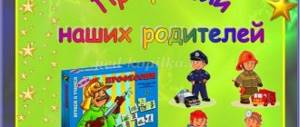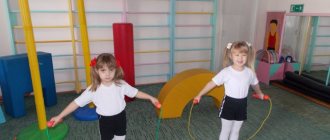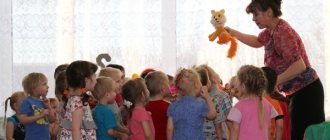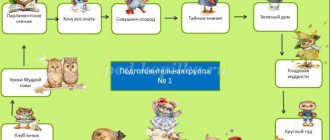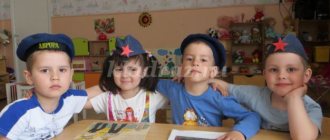Puzzles
Many games that develop verbal or auditory thinking are oral. You can wish for a certain object, but answer the question only “yes” or “no”. Let's say I wished for something that was on my table. And the child begins to ask: - Is it big? I say: - No. - Is it bigger than a glass? - No. - Is it square? - Almost. - Is it iron? - No. - Is it wooden? - No. - Is it rubber? - Yes .− Is it black?− No.− Is it white?− Yes.− Is it an eraser?− Yes, it is an eraser. You guessed right, well done. Now you tell me a riddle, and I will ask. You can riddle some simple things and suddenly it turns out that they are not so easy to guess even for an adult, although the riddled object is completely simple, everyday. You can make verbal riddles. But not the classic, folk ones, which everyone knows and which are published in collections: the girl is sitting in prison, and the braid is on the street. Modern children have not seen how a carrot grows, so they cannot guess what kind of braid it is on the street, why the girl is sitting in prison and why this has to do with carrots. That is, they are ready to learn both this text and this answer. But they can’t relate, they didn’t see it, it’s a difficult metaphor. By riddles I mean something completely different. You can describe an object by naming several of its characteristics and giving a definition. For example, an animal that meows. − I wished for a striped animal that eats grass. The child says: − Tiger? − Not a tiger. A tiger doesn't eat grass. And this beast also has hooves and a mane.− Ahhhh, horse!− Striped! Or I can say:− Yes, only the name of the beast begins with the letter “z.”− Striped horse with “z”... A- ah, zebra! Or I can say: − Sour, yellow and oval. Child: − Oh, I know, it's a fruit. − Yes, fruit. Which one then? They also put it in tea. - Yeah, yellow, lemon! Or: - Red, round, they put it in salad. I could mean a tomato, but the child says: “Radish.” Great, that's good too. It is useful to come up with such riddles. No less useful than guessing.
Games for younger students
By the time they enter school, boys and girls communicate freely with other people on various topics. A child prepared for learning has a developed phonemic awareness, he can distinguish sounds in words, can correlate a sound with a sign and depict this sound. It is necessary to teach the student to construct texts, compose descriptions from pictures, work on the expressiveness of oral speech, on enriching the vocabulary, on competent writing.
At this stage, reading plays a huge role. If a child has previously been instilled with an interest in books, then he begins to read simple texts on his own, drawing cognitive and instructive information from there, developing memory and intelligence. Of course, if parents don't read, it's unlikely that their son or daughter will be interested in it.
"What if"
This game is suitable for both one child and a group of children.
For the game, you should prepare cards in advance with questions written on them in the form: “What would happen if?” The endings of the question should be like this:
- if all the adults disappeared;
- if night never came;
- if an elephant moved into our apartment;
- if there were no insects.
The cards should be laid out wrong side up. Ask your child to take out one card and think about the topic of the question.
Encourage your child to think outside the box
"Make Words"
On a large piece of paper (on the board) you need to write a long word (car, power plant, rock climber). Participants in the game need to create new words from the letters of this word. The winner is the one who comes up with the most new words.
"Let's make up a fairy tale"
The game requires several participants.
The first player comes up with the beginning of a fairy tale (one sentence). The next one adds his own. So all the participants in the chain come up with an interesting story.
"Stupid Suggestions"
The game requires at least two participants. One comes up with a word, and the second composes a sentence in which each word begins with the letters of the word that the first participant named. For example, the word “table” deciphers as “the dog was stomping around the boat.”
Invite the children to create their own fairy tales and funny stories.
Tongue twisters and poems
It’s not so easy for an adult to say them. Therefore, if you are playing tongue twisters with your child, start with yourself. Try to pronounce it quickly and quickly and show your child how you practice, how you train, how you learn it. You can play with some poems: you start, and the child remembers the appropriate word at the end. − Where did the sparrow have lunch? At the zoo there are...− ...animals. While the child remembers the right word, you can offer funny options. From the threshold. - No, not from the threshold. - What? - A little!
Word game rules
Word games have a wide range of applications.
They can be used both as developmental (for ordinary children) and as correctional (if your child has problems).
Use 1-2 exercises each time. If you change the instructions, it will be a different game based on the same material (example: “Recognize pets”).
At the end of the word game, it will be useful to choose an object and draw it. Drawing will help to correlate the word and the image, which is important for the development of interaction between the hemispheres of the brain.
And some more good advice. Teachers have a good rule: make card indexes. It just won't hurt parents either.
Collect word games. Glue each exercise onto cardboard and place it in a box. You will get an easy-to-use card index (you don’t have to search the Internet every time). We tried to arrange the material in a form convenient for filing cabinets.
Teach your baby to play physical and verbal games. He will be able to become a ringleader and a leader among his peers. Children will be drawn to it and will respect your child.
Superfluous word
You can also play - name some groups of words and guess who is the odd one out. What is significant is that there can be several correct answers in this game. You can play it on the go; encourage your child to come up with such riddles. But it is important that he explains his decision. For example, I can say: “bus, tractor, trolleybus, tram.” Which of these words is redundant? Some might say bus because it starts with "A" and all the others start with the letter "T." Someone will say that it is a tram, because it is the only one that runs on rails, and everyone else does not. Someone will say that it is a tractor, because it is not public transport, and all the others carry people. Do you understand, right? Any explanation is good. It is important that it is also useful for the child to come up with such problems. After all, only adults are always the bearers of the ultimate truth: first you make a wish, then the child. And this is not only a game, but also a communication process. If you like to make things up, that's great.
Snowball
There is such a wonderful game “Snowball”. It is both verbal and memory developing. One says: - Cat. Second: - Cat, dog. Third: - Cat, dog, hare. Fourth: - Cat, dog, hare, tiger. You can pronounce any words. There is also another version of this game. Let's say the first one says: - I'm going on a hike and take a spoon with me. The second: - I'm going on a hike and take a spoon and a bowl with me. And so on. Everyone adds their own. But at the end, not at the beginning. That is, initially he must remember all the words that were said before him, then add his own. When we play with a group of children, I suggest not only naming the words, but also, if someone has forgotten, you can give hints, but only with gestures. You can name the first letter in each word, and this is also not so easy for some children. But when you have already done it, then some riddles are all with the same letter. For example, we think of all words starting with the letter “M”. I say: “It’s so big, with wheels, you can drive it.” “A car.” “Okay, then I’ll think of something else starting with the letter “M.” It’s so tasty, cold and comes in a waffle cone.− Oh, it’s ice cream!− And it’s also so sweet and it’s made by bees.− Honey. It’s much more difficult: coming up with a word that starts with this letter, and then describing it - this is serious work for a child.
Games with words for children five to six years old
Preschoolers of this age usually express their thoughts clearly and construct logical statements. By school they should have a rich vocabulary, be able to clearly pronounce all sounds, and retell short stories. Speech games will help them master these skills.
At this age, the child should read a lot, ask questions and listen carefully to him, ask riddles, solve crosswords, puzzles, and charades.
"Broken phone"
The game requires the participation of a group of children.
Boys and girls sit in a row. The adult whispers a simple word that the kids can understand in the first player’s ear so that others don’t hear. He passes the word to another, also in a whisper. The last player says the word he heard out loud.
Since the word often reaches the last player in a distorted version, the game usually turns out to be fun and intriguing.
"Traffic light"
The game can be played with one child or with several.
To play, you will need one green and red paper circle cut out for each participant. Thematic cards with objects familiar to children depicted on them will also come in handy.
An adult shows cards and says what is drawn on them, sometimes deliberately pronouncing words incorrectly (instead of “banana” he pronounces “bavan”, instead of “vitamin” he says “vitanin”). If the word is named correctly, the children raise a green circle, if not, a red circle.
Instead of using circles of different colors, you can agree with children on symbols indicating “right” and “incorrect” words
"Catch the Ball"
The game can be played individually with a child or with a group of children. For this you will need a ball (balloon).
The adult names the noun and throws the ball to the child. He must catch the ball and name the adjective formed from this word: winter - winter, rain - rainy, tree - wooden, etc.
Team games with words teach children quick reactions and the ability to cooperate
Contact
This game is suitable if the child already knows what the first letter is and understands the definition: “this is an animal that meows.” If he does not name the word itself, but says a description, then after that you can already play. I think many people know the rules, but I’ll tell you again just in case. Contact is a game for several people, you need at least 3-4 participants. The presenter thinks of a word and tells all the other players the first letter, for example “K”. The rest of the players begin to come up with their own words that begin with “K”, for example, one says: “Isn’t this the kind of animal that meows?” The presenter says: “No, this is not a cat (if he really didn’t wish for a cat). The other says: - Isn’t this the same, Cheburashka’s friend? Presenter: - Gena. No, wait, “K.” This is not a crocodile. And so all the players are trying to come up with a definition so that they understand, but the presenter does not understand. And if suddenly they succeed, for example, one of the players says: “It’s sweet and they eat it boiled.” The presenter says: “Porridge.” “No, it grows in the field, it’s tall and has hairs inside it.” The presenter says: “Oh, I don’t know. Then the rest of the players start counting: to 3, to 5 or to 10, it’s up to you. And they say “Contact!”, and then pronounce the guessed word in unison. If the one who gave the definition and the one who said “corn” agree, then the driver must tell them the next letter. “Okay, then I’ll tell you the second letter.” The second letter is “O”. And then all the players who guessed come up with “Ko”. And then, let’s say, they came up with some other definition that the driver didn’t guess, then they already have three letters. And so little by little they guess the word. And whoever finally guesses right becomes the next driver. This game is not as simple as it might seem - it can be difficult for adults to play. But if you are not in a hurry, you are not trying to beat the child, then the game process will bring pleasure to everyone. If you do not try to measure who won and who lost, then it works quite well. For example, it allows you to find out how words are written. It can be very funny to play with children; they come up with non-trivial spelling and do not always understand which letter is next in the hidden word.
Word games for children 6-7 years old
Entering school requires a first-grader to concentrate on educational activities. Of course, in the first year or two, teachers still try to include playful moments in the educational process, but still, studying is not toys, but a serious activity that requires willpower, composure and perseverance.
But still, the main activity of a child in the first years of life is play. Through play, kids get to know the world around them:
- learn letters and numbers;
- train memory and attention;
- develop logical and innovative thinking;
- study colors and shapes, seasons and days of the week;
- stimulate creative and emotional intelligence;
- learn the principles of healthy communication with other people.
When the child reaches the age of 6-7 years, when active preparation for school begins, parents often push games into the background, urging their beloved child to get used to the upcoming realities as a student. Yes, you can partially replace educational games with activities that are more similar in structure to a traditional school lesson, but you still need to play during this period and, let’s say, in any other period - right up to old age. Moreover, you can successfully combine learning with entertainment. To help all mothers and fathers anxiously awaiting entry into the ranks of parents of first-graders, here are word games for children of senior preschool age.
Benefits of word games
Verbal games include all games in which the main element is the word. These are various kinds of associations, and chains, and leapfrogs, and even all kinds of crosswords: scanwords, chainwords, fillwords, diwords, etc. Some of them involve organizing leisure time for a large cheerful company, others allow you to spend interesting time alone with yourself. But all word games are united by a common characteristic - they do not require any (well, almost any) additional attributes. Maximum - a pen and a piece of paper, a ball, cards with pictures, words or letters.
You can play word games with children anywhere:
- Houses;
- on a walk;
- on the road;
- queue.
It is well known that at any age, verbal games actively stimulate the development of cognitive mental processes:
- attention;
- memory;
- thinking;
- imagination;
- speech.
We believe that we have convinced you that playing is not a hindrance to studying. This means it’s time to move from words to deeds. More precisely, to the game. Word game.
Word games with ball
"I know…"
The game can be played by any number of participants. You can play alone, then the ball is not thrown from player to player, but bounces off the ground. An excellent activity for training dexterity and coordination of movements, developing memory and attentiveness (after all, words in the game cannot be repeated).
Sitting in a circle, the players throw the ball clockwise to each other, reciting the rhyme:
- I
- I know
- ten (if it is still difficult to name 10 items of the same category, the number can be reduced to 5 or even 3)
- flowers (categories can be very different - female and male names, months, days of the week, colors, geometric shapes, birds, vegetables, etc.)
The following is a list of items and their counting:
- chamomile - once;
- buttercup - two;
- lilac - three...
If the player hesitates and cannot quickly name the flower, he passes the ball further around the circle, and at the end of the game (when all the participants in this category have been named by the joint efforts of all participants), he will have to complete some task (tell a rhyme, sing a song, answer a question). question, jump on one leg, etc.)
"Edible - inedible"
At a time when all the courtyards were filled with groups of children of different ages, residents of nearby houses through open windows could hear for days on end how excitedly children were playing this incredibly popular game at that time. If your childhood passed without it, we will tell you surprisingly simple rules.
From among the players (there can be as many of them as you like, but not less than two), water (the leader) is selected. He stands opposite the rest of the guys and throws the ball to each of them in turn, saying any word:
- cucumber;
- bench;
- house;
- blazer;
- bun...
If the object called water can be eaten, the player catches the ball with his hands and then returns it to the leader. If the word is “inedible”, the ball must be hit. The player who reacted incorrectly to the word changes places with the leader.
Instead of classification by “edibility”, any other characteristic can be used. For example, catch the ball if the named word denotes transport (flower, objects of wildlife...), otherwise, hit it.
"Tender ball"
The game develops dexterity and speed of reaction. Useful at the stage of learning diminutive suffixes. Great for parent-child play. You can play with several children at once, throwing the ball to each of them in turn.
The rules are simple: when throwing the ball to the baby, you say the main word. The child must catch the ball and then throw it to you, calling the word in a diminutive form.
Examples:
- chair - stool;
- eye - little eye;
- sun - sun;
- doll - doll.
"Who's cooking?"
A game to consolidate knowledge about the variety of professions.
The adult names the action and throws the ball to the child, and the child, returning the ball, must name the profession corresponding to this action:
Examples:
- cooks - cook (cook, pastry chef);
- draws - artist;
- writes - writer (journalist, poet);
- builds - builder;
- treats - doctor.
You can change roles: the presenter names the profession, and the players catch the ball and name the appropriate action.
"Earth, water, air"
The presenter names the element (earth, water or air) and throws the ball into the player’s hands. The player must catch the ball and in a split second name the creature that lives in this element.
You can use category names (birds, fish...) and specific names (perch, pike, swallow). The main condition: words should not be repeated. If it is impossible to name the word or there is a repetition, the loser must complete the task of the presenter.
Example:
- water - crucian carp;
- earth - boar;
- the air is a sparrow.
General for word games with a ball
All the games described are suitable for organizing activities with a 6-7 year old child on the street and at home. You can use a small soft ball or skip the ball altogether, simply saying the words of the game one by one. In these educational games, the ball serves several purposes:
- requires successfully distributing attention between several actions (catching a ball and thinking about the correct answer);
- regulates the time for thinking about an answer (the ball should not linger in the player’s hands for more than 3 seconds - by agreement, this time can be extended or reduced);
- adds dynamism and excitement to the game.
Word games to develop logical thinking
"Who's the odd one out"
In early preschool age, tasks for the development of mental processes of generalization were carried out using pictures. The child was asked to select several groups from a series of drawings, combining the depicted objects according to different characteristics (size, color, quantity, purpose, etc.), or, on the contrary, remove the extra picture. For a child 6-7 years old, this game can be played in verbal form. Thus, among other things, figurative thinking, imagination and phonemic hearing are involved.
Name a series of words in which all but one are united by common features. At the same time, the task can be complicated by demonstrating that the same objects have a number of characteristics, and you can select group mates for them based on each of the qualities.
Example:
- Bed, wardrobe, table, chair, sheet.
In this group, the word “sheet” is redundant because, unlike the others, it does not mean furniture.
- Pillow, blanket, sheet, bed, wardrobe.
In this group, like in the previous one, there are the words “bed”, “sheet” and “wardrobe”. The extra word this time is “cabinet”, since it does not denote an object that can be used for sleeping and relaxing.
"Danetki"
Danets are a special type of riddles that perfectly develop logical thinking and teach you to think outside the box and creatively. The player is given a task that requires a solution. To find this solution, the player (several guessers are allowed to participate, then they must ask questions to the presenter in turn) asks the presenter leading questions, to which there can be only three possible answers:
- Yes
- No
- doesn't matter
The goal is to find the right solution in a minimum number of questions. You can add a competitive element by declaring the winner the player who first guesses how to solve the puzzle. Examples of ready-made danettes are available on our website. Having trained on ready-made riddles, you will be able to come up with similar problems yourself.
Puzzles
Riddles are a variant of word games known since ancient times that perfectly develop logic. But we suggest not using ready-made author’s or folk riddles, but composing them, as they say, on the go. Moreover, the players must alternately change the roles of guesser and riddle: first you guess, and the child guesses, then vice versa.
This game task develops the ability to identify the characteristics of an object, recognize objects by description, and compose a verbal description by which one can recognize the object.
Example:
This vegetable is green even when ripe. There is no need to boil or fry it. It can be salted, pickled and fermented.
As you probably guessed, this is a cucumber. If the child cannot guess the riddle, add new conditions. Say that you like to add this vegetable to salad, that it is in your grandmother’s garden beds at the dacha... In general, develop not only your child’s thinking, but also your own. Will come in handy
